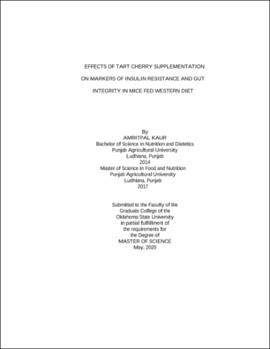| dc.contributor.advisor | Lucas, Edralin A. | |
| dc.contributor.author | Kaur, Amritpal | |
| dc.date.accessioned | 2020-09-09T21:26:41Z | |
| dc.date.available | 2020-09-09T21:26:41Z | |
| dc.date.issued | 2020-05 | |
| dc.identifier.uri | https://hdl.handle.net/11244/325504 | |
| dc.description.abstract | Objectives: Tart cherries (TC) are rich source of phenolic compounds such as anthocyanins and flavonoids that can promote health by influencing the gut microbiota. This study investigated the effects of TC supplementation on gut health and metabolic parameters in mice fed a western diet (WD). | |
| dc.description.abstract | Methods: Six-week-old male C57BL/6 mice were randomly assigned to dietary treatment groups in a 2x3 factorial design with diet (control [AIN-93M] or WD, 45% fat kcal and 26% sucrose kcal) and TC (0, 5, 10% wt/wt) as factors for 12 wks. At the end of dietary treatment, body composition was assessed, and tissues were collected to evaluate metabolic parameters and markers of gut health. Cecal content was used for bacterial and short chain fatty acid analyses. Data was analyzed using two-way ANOVA with Kruskal-Wallis/Dunn's and Tukey's as post-hoc tests for the gut microbiota data and metabolic parameters, respectively. | |
| dc.description.abstract | Results: TC at 10% dose significantly increased the abundance of the beneficial bacterial phylum, Actinobacteria, relative to the unsupplemented groups (p=0.018 and 0.010 vs control and WD, respectively). Relative cecal weight (p=0.007) and cecal propionic (p=0.0212), i-butyric (p=0.0183), i-valeric (p=0.0126), n-valeric (p=0.0261), and n-heptanoic acids were significantly increased with TC supplementation. Histological evaluation revealed reduced ileal villi height (p=0.0348), width (p=0.0042) and area (p=0.0132) with WD and TC did not alter this response. Overall, the expression of genes related to gut health was unaffected by both WD and TC supplementation. Body weight (p=0.0012), fat mass (p=0.007), fasting blood glucose (p=0.001), serum total cholesterol (p<0.0001), triglyceride (p=0.002), leptin (p=0.0011), plasminogen activator inhibitor 1 (p=0.0344), and resistin (p=0.0012) were increased with WD and TC had no effect on these parameters. Despite modest effects on metabolic parameters, the homeostatic model assessment of insulin resistance, HOMA-IR, a commonly used tool for assessing insulin resistance, was significantly improved by 5% TC (p=0.0003). | |
| dc.description.abstract | Conclusion: TC supplementation restored some beneficial bacteria and increased short chain fatty acid production altered by WD. However, these changes in the gut did not translate to improvement in metabolic outcomes except for HOMA-IR. The mechanism by which TC improve HOMA-IR needs to be investigated in future studies. | |
| dc.format | application/pdf | |
| dc.language | en_US | |
| dc.rights | Copyright is held by the author who has granted the Oklahoma State University Library the non-exclusive right to share this material in its institutional repository. Contact Digital Library Services at lib-dls@okstate.edu or 405-744-9161 for the permission policy on the use, reproduction or distribution of this material. | |
| dc.title | Effects of tart cherry supplementation on markers of insulin resistance and gut integrity in mice fed western diet | |
| dc.contributor.committeeMember | Smith, Brenda J. | |
| dc.contributor.committeeMember | Lin, Dingbo D. | |
| osu.filename | Kaur_okstate_0664M_16721.pdf | |
| osu.accesstype | Open Access | |
| dc.type.genre | Thesis | |
| dc.type.material | Text | |
| dc.subject.keywords | glucose | |
| dc.subject.keywords | gut microbiota | |
| dc.subject.keywords | short chain fatty acids | |
| dc.subject.keywords | type 2 diabetes | |
| thesis.degree.discipline | Nutritional Sciences | |
| thesis.degree.grantor | Oklahoma State University | |
